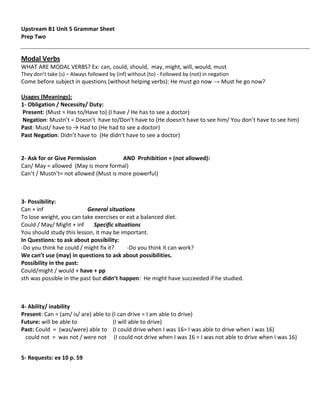
Grammar Modal Verbs Sheet
- 1. Upstream B1 Unit 5 Grammar Sheet Prep Two Modal Verbs WHAT ARE MODAL VERBS? Ex: can, could, should, may, might, will, would, must They don’t take (s) – Always followed by (inf) without (to) - Followed by (not) in negation Come before subject in questions (without helping verbs): He must go now → Must he go now? Usages (Meanings): 1- Obligation / Necessity/ Duty: Present: (Must = Has to/Have to) (I have / He has to see a doctor) Negation: Mustn’t = Doesn’t have to/Don’t have to (He doesn't have to see him/ You don’t have to see him) Past: Must/ have to → Had to (He had to see a doctor) Past Negation: Didn’t have to (He didn't have to see a doctor) 2- Ask for or Give Permission AND Prohibition = (not allowed): Can/ May = allowed (May is more formal) Can’t / Mustn’t= not allowed (Must is more powerful) 3- Possibility: Can + inf General situations To lose weight, you can take exercises or eat a balanced diet. Could / May/ Might + inf Specific situations You should study this lesson, it may be important. In Questions: to ask about possibility: -Do you think he could / might fix it? -Do you think it can work? We can’t use (may) in questions to ask about possibilities. Possibility in the past: Could/might / would + have + pp sth was possible in the past but didn’t happen: He might have succeeded if he studied. 4- Ability/ inability Present: Can = (am/ is/ are) able to (I can drive = I am able to drive) Future: will be able to (I will able to drive) Past: Could = (was/were) able to (I could drive when I was 16= I was able to drive when I was 16) could not = was not / were not (I could not drive when I was 16 = I was not able to drive when I was 16) 5- Requests: ex 10 p. 59
- 2. 6- Logical Assumptions/ Deductions Present of all modals: must, may, can’t …etc + inf Past of all modals: must, may, can’t … etc + have + pp Different Meanings: Must: sure Present: She’s been working all day, so she must be tired now = I am sure that she is tired now. Past: She’s been working all week, so she must have been tired yesterday = I am sure she was tired yesterday. May/ might / could: not sure Present: John is not at work today. He may/ might / could go home= He goes home, I'm not sure Past: John was not at work yesterday. He may/ might / could have gone home = He went home, I am not sure Can’t/ couldn’t: impossible Present: He can’t be focused at the moment. He is so tired = It's impossible that he is focused now. Past: He can’t have studied yesterday. He cannot answer any question.= It is impossible that he studied yesterday Too too + adj (for sb/ sth) to inf = cannot - He is too young to drive = he cannot drive = he is not allowed to drive - The bag is too heavy (for me) to carry = I cannot carry it Enough (adj + enough) enough (for sb/ sth) to + inf = sth is as much as needed he is old enough to drive = his age is as much as needed not enough (for sb/ sth) to + inf = sth is not as much as needed he is not old enough to drive = his age is not as much as needed (Enough + noun) -I've got enough sugar to make a pancake -I've not got enough money to buy a car.
